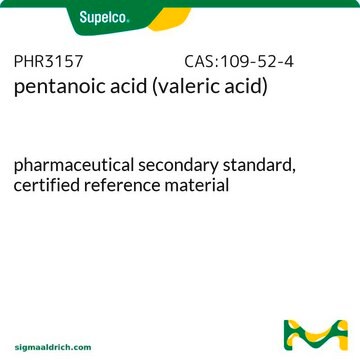75054
Valeric acid
analytical standard
Synonym(s):
n-Valeric acid, Pentanoic acid
About This Item
Recommended Products
grade
analytical standard
Quality Level
vapor density
3.5 (vs air)
vapor pressure
0.15 mmHg ( 20 °C)
Assay
≥99.8% (GC)
autoignition temp.
707 °F
shelf life
limited shelf life, expiry date on the label
expl. lim.
7.6 %
technique(s)
HPLC: suitable
gas chromatography (GC): suitable
refractive index
n20/D 1.408 (lit.)
n20/D 1.408
bp
110-111 °C/10 mmHg (lit.)
185 °C (lit.)
mp
−20-−18 °C (lit.)
density
0.939 g/mL at 25 °C (lit.)
application(s)
cleaning products
cosmetics
flavors and fragrances
food and beverages
personal care
format
neat
SMILES string
CCCCC(O)=O
InChI
1S/C5H10O2/c1-2-3-4-5(6)7/h2-4H2,1H3,(H,6,7)
InChI key
NQPDZGIKBAWPEJ-UHFFFAOYSA-N
Looking for similar products? Visit Product Comparison Guide
Related Categories
General description
Application
Signal Word
Danger
Hazard Statements
Precautionary Statements
Hazard Classifications
Aquatic Chronic 3 - Eye Dam. 1 - Skin Corr. 1B
Storage Class Code
8A - Combustible corrosive hazardous materials
WGK
WGK 1
Flash Point(F)
192.2 °F - closed cup
Flash Point(C)
89 °C - closed cup
Personal Protective Equipment
Choose from one of the most recent versions:
Already Own This Product?
Find documentation for the products that you have recently purchased in the Document Library.
Customers Also Viewed
Our team of scientists has experience in all areas of research including Life Science, Material Science, Chemical Synthesis, Chromatography, Analytical and many others.
Contact Technical Service










